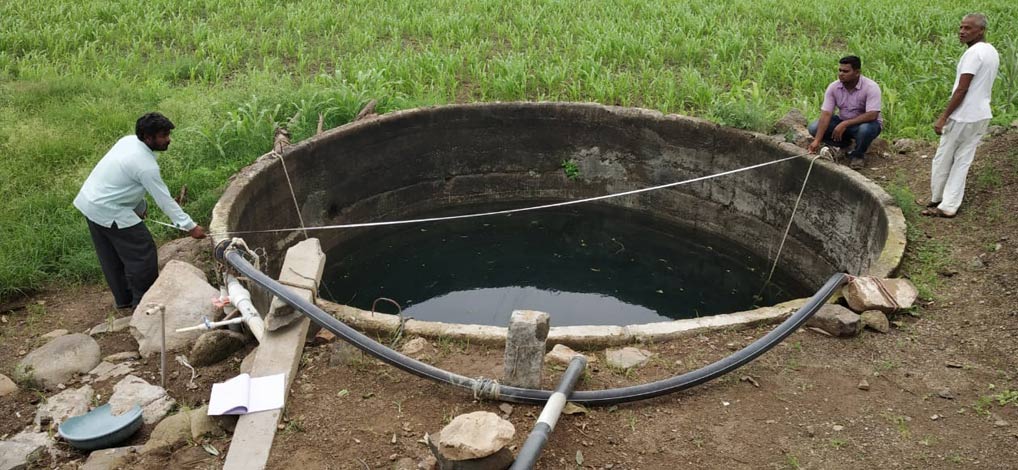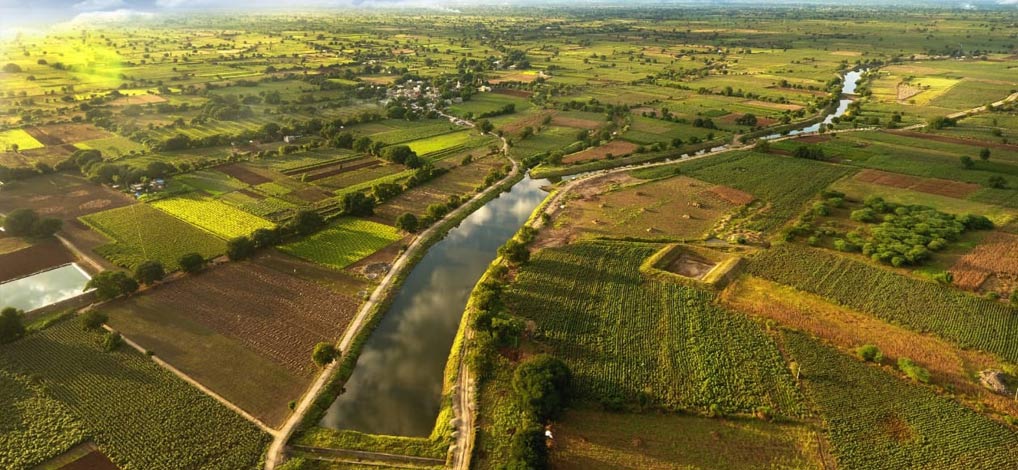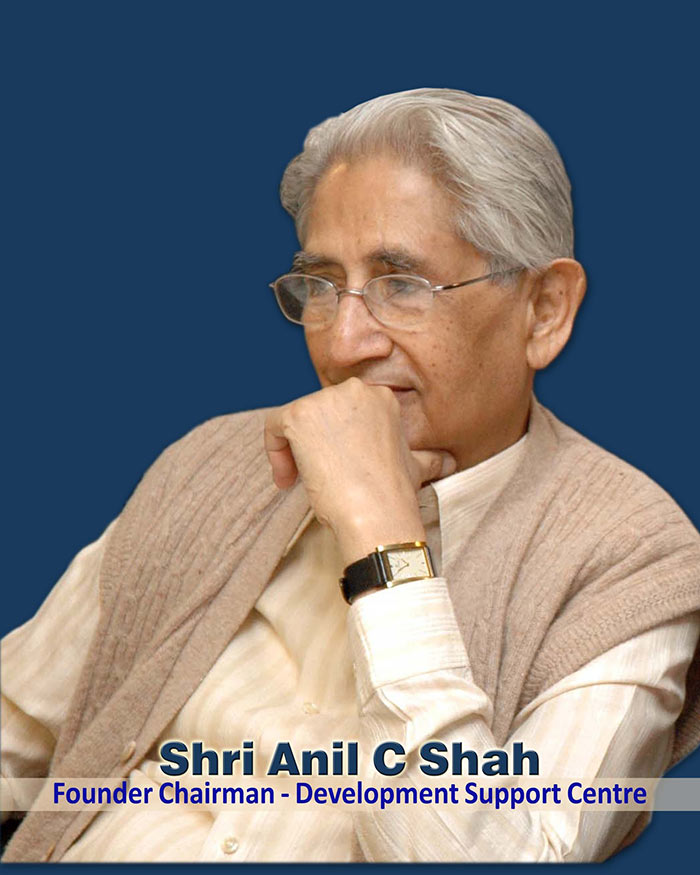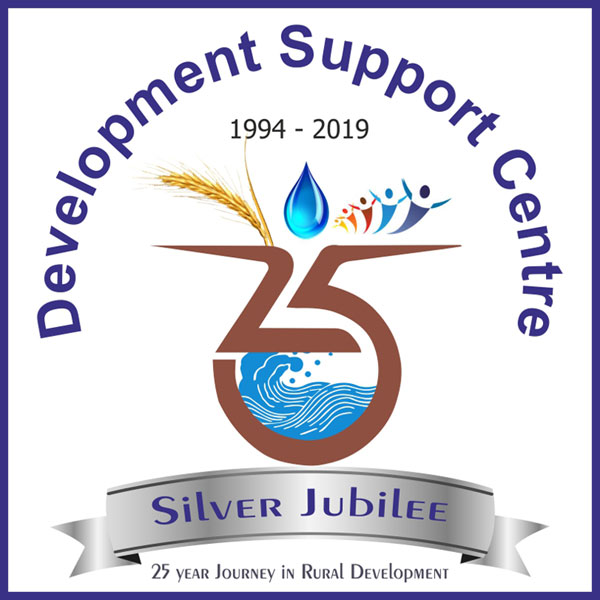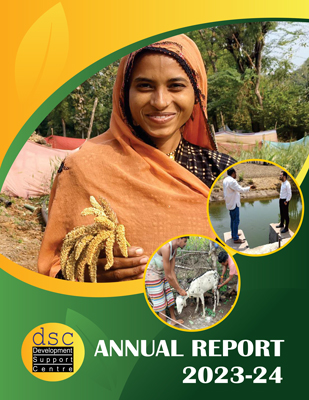Agricultural Productivity Enhancement
Home  Agricultural Productivity Enhancement
Agricultural Productivity Enhancement
'LIVELIHOOD ENHANCEMENT THROUGH PARTICIPATORY NATURAL RESOURCE MANAGEMENT' IN RAINFED AND IRRIGATED AREAS OF RURAL GUJARAT (LEPNRM).
After augmenting natural resource management through watershed and PIM programmes, DSC initiated agriculture based livelihood enhancement programme in six field units in Gujarat in 2007 in order to further enhance agricultural income.
The areas where LEPNRM is being implemented include Dharoi (Visnagar, Vadnagar, Kheralu and Satlasna talukas of Mehsana district), Guhai (Himmatnagar taluka of Sabarkantha district), Mazum (Modasa taluka of Sabarkantha district), Meghraj (Meghraj taluka of Sabarkantha district), Vehlal (Dehgam taluka of Ahmedabad district) and Dhari (Dhari Taluka of Amreli district) covering more than 180 villages and about 45,000 households. The project focuses on following five main components of agriculture enhancement; reducing cost, mitigating risk, increasing productivity, value addition and market linkages with an aim to increase incomes of farmers especially those that are small and marginal. Some of the notable project achievements during the year are given below:
 Vermi compost production through entrepreneurship model
Vermi compost production through entrepreneurship model
DSC has been promoting vermi compost to help farmers maintain soil health. In the last three years alone, more than 100 farmers have started preparing vermi compost. However there is a huge gap between the demand and supply of vermi compost in the market. In order to address this issue, the Dharoi and Guhai field units decided to organize women into groups and encourage them to start large scale production of vermi compost following a business/entrepreneurship model that would ensure regular income to the women. Till now, two women groups of Kesimpa and Dedasan villages have been facilitated for the preparation and sale of vermi compost. The two groups have invested Rs. 1.71 lakhs out of which the project shared Rs. 1.35 lakhs and the members contributed Rs. 36,000 in cash. The initiative is expected to produce about 312 tons compost from 52 beds @ 6 tons production from per bed. The estimated gross income per year by selling ready compost is Rs. 9.36 lakhs @ Rs. 3,000 per ton, which should enable the business to break-even within a year.
Introduction of high value variety of wheat - "Sharbati Gehun"
Wheat is the major food crop of the project area and is planted by nearly all the small and marginal farmers during rabi season. For the first time, Gujarat farmers planted Sharbati variety of wheat which is traditionally grown in MP. This variety fetches a higher market price in Gujarat in the name of "Sharbati Gehun". Raising this crop also makes economic sense since it requires only 2-3 waterings compared to local varieties that need 6-7 waterings. The production of this variety is in the range of 40-50 quintals/ha with its market price ranging between Rs. 17-23 per kg depending on the quality of the grain.
Income generation through processing and marketing of spices
About 40 women from small and marginal farm families of Kamalpur, Karbatiya and Kesimpa villages of Visanagar and Vadnagar talukas have started processing of spices i.e. cumin, fennel, mustard, and dil seeds for income generation. They procure spices in bulk, process them and sell them in 1 kg packets in the open market. The women plan to scale up these activities in the coming years.
Seed Processing and Marketing of Wheat, Soybean & Groundnut
This year too, the Dharoi, Guhai and Mazum federations and Dhari DKVPC federations procured about 24 tonnes of wheat of different varieties including MP's Sharbati from farmers for processing. For the first time, the Guhai federation produced 10 tonnes of 'certified seeds'. Also, the federations have acquired a license from the Agriculture Department for preparation and supply of seeds and other inputs. Already, the Modasa federation and Dhari field unit are involved in processing 5000 kg soybean seed and 5000 kg groundnut seed respectively.
Cotton procurement through collaboration with IKEA
IKEA is one of the world's largest home furnishing companies. It sells cotton products throughout Europe and other continents and is a partner in global initiatives for Better Cotton. DSC has tied up with IKEA for two Kharif seasons in 2009 and 2010 for better marketing of cotton which covers the second largest crop area in its field units. Under the partnership, IKEA would help DSC in areas such as extension of best crop practices, bringing in technical know-how and bulk procurement of cotton in Visnagar and Dhari field areas. An intensive field campaign for promoting better cotton practices and bulk procurement of cotton under the IKEA support project has already been conducted by the Dhari and Visnagar teams. More than 105 tonnes of seed-cotton has been procured from 85 farmers of 3 villages in Dhari. The firm has procured cotton from the farmers from their doorstep at prevailing market rates. As per a rough estimate, farmers have managed to save upto Rs. 1-1.20 lakhs in transaction costs that they would have incurred by selling the seed cotton in the local gunj bazaar. The firm could not procure cotton from Visnagar as the farmers and the ginner could not agree on the price offered to them by the ginner. DSC and IKEA intend to appoint another ginner in Visnagar as well as scale up procurement and Better Management Practices (BMP) in the next season.
Cultivation, processing and marketing of Ginger
The ginger produced in the Meghraj area is very popular in the region for preparing dry ginger that is locally known as "Sunth". Generally, major ginger merchants from neighboring districts come and procure fresh ginger from Meghraj area, process it through either mechanical/manual means and sell it in the market. Under DSC's initiative, a committee of farmers has procured more than 3500 kgs of fresh ginger from 22 farmers for processing which is expected to fetch a gross income of Rs. 1.40 lakhs for the local farmers.
Crop diversification: Introduction of papaya and water melon
For the first time, farmers in the Dhari area planted Taiwan papaya in 26 acres of land with technical assistance and market linkage facilitation from DSC and the Dhari field unit. The crop has been harvested and farmers received an average production of 30 tonnes per acre. The Papaya was sold in the market @ Rs. 5850-Rs. 6500 per tone which resulted in a gross income of around Rs. 48 lakhs for the farmers. This has led to the farmers actively considering scaling up papaya cultivation in the next season. Successful introduction of watermelon in Visnagar area last year has now been scaled up in other villages and also replicated in Vehlal and Modasa units. Farmers are earning good profit from this new crop at the rate of Rs. 25,000-30,000 per bigha with the market price of watermelon ranging between Rs. 12-15/Kg. This crop has very good potential in the irrigated areas particularly for medium farmers having drip irrigation facilities.
Contract farming of potato
The Modasa field unit has been facilitating farmers in the cultivation of potato under contract farming. This year eight farmers signed a contract with S.K. International and Pepsico for cultivation of the Atlantic seed variety of potato. Under the contract, the companies will provide seed on 50 per cent advance payment and offer a price of Rs. 6 per kg for buy back of potato production.
Development of low cost user friendly micro irrigation system
In absence of a low cost and efficient micro irrigation system suitable for marginal farmers and women vegetable cultivators, DSC decided to collaborate with Reliance Plastic Ahmedabad and Navsari Agriculture University for fabrication of low cost micro irrigation systems particularly suited to the requirements of this target group. After a series of exposure visits to the Navsari University research centre, the Visnagar, Himmatnagar and Modasa field units have fabricated 15 demonstration units of the low cost micro irrigation system, each consisting of a 500 litres plastic tank, tape and plastic laterals. The cost of the system ranges from Rs. 1500 -2700 with a tank and Rs. 700 - 1700 without a tank and can serve 90-100 vegetable plants. The fabricated micro irrigation systems are functioning satisfactorily and are likely to be scaled up in the next year based on farmers' response.
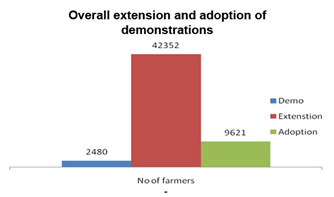 Switching to Organic Farming - replication of "Bio Pesticide"
Switching to Organic Farming - replication of "Bio Pesticide"
The Himmatnagar field unit has developed a bio-pesticide that can be prepared from ingredients generally available within the household. User trials of the bio pesticide have been successfully piloted in Himmatnagar over the last two crop seasons on brinjal, cotton and other crops. The cost of cultivation has come down because of reduced number of bio-pesticide sprays required. Other DSC field units have made several exposure visits to Himmatanagar to learn from the experience of using bio-pesticides. Encouraged by the benefits, Vehlal, Dharoi and Modasa units have prepared more than 1500 litres of bio pesticide that will be sold by the federations to farmers in the local area.
Adoption ratio of demonstration best practices
DSC's six field units have conducted a rapid assessment of adoption of demonstration best practices by the farmers. According to the assessment, major crop demonstrations have been taken up with 2480 farmers (5 per cent), field days and exposure visits conducted for 42,352 (94 pent) farmers and 9621 or 21 per cent of the total farmers have adopted best practices. These ratios are expected to improve further by the end of Rabi 2010-11 when three years of the systematic extension programme will get completed.
Capacity Building and Communication
Since the start of the project in October 2007, a total of 934 programmes have been conducted, involving 37,127 participant days. DSC has prepared audio visual and printed materials that can help in the promotion of best management practices and technologies for farmers. The project learning is documented in the form of crop manuals, a quarterly magazine "Divadandi", display panels, video film, cell phone SMS services and a radio programme which are disseminated among farmers as part of regular capacity building programmes. Three crop manuals have been prepared on Sorghum, Maize and Groundnut and 30,000 copies will be distributed to the farmers before next monsoon.
Video film on "Scientific method of wheat cultivation"
DSC has prepared a 45-minute video film on scientific method of wheat cultivation in Gujarati language. The film was screened in 150 villages within the project area during the Rabi season. About 350 copies have been provided to the Agriculture Departments and eminent NGOs in other districts of Gujarat. In all, about 50,000 farmers have watched the film in over 500 villages. The film has got an overwhelming response not just from the farmers but also scientists and development professionals. The film is available with English sub titles as well.
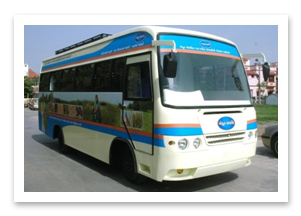 Farmer Managed Mobile Agriculture Extension Services
Farmer Managed Mobile Agriculture Extension Services
DSC with support from the Innovation Fund project of the Aga Khan Foundation (India) has launched a Multipurpose Mobile Van for providing agriculture extension services to farmers in both irrigated and rainfed areas of operation. The van will be jointly managed by the three Federations and the District Resource Centre set up by DSC in Sabarkantha district. It will be equipped with a modern soil and water testing laboratory and audio visual aids in order to provide agriculture extension services to the farmers at their doorstep. The van will travel to villages on the invitation of farmer institutions like Watershed Associations, Irrigation Cooperatives, Agriculture Cooperatives, Panchayats etc. A team of professionals attached to the van will conduct laboratory testing and provide other services to farmers on the basis of a service fee. The federations will be responsible for overall coordination and supervision of the van under DSC`s guidance. It is expected that the van will test 15,000 soil and water samples in a year besides offering other extension services. The van is proposed to become a revenue generating model based on service fee collections and fund mobilization from beneficiary farmers, village institutions and government departments.









